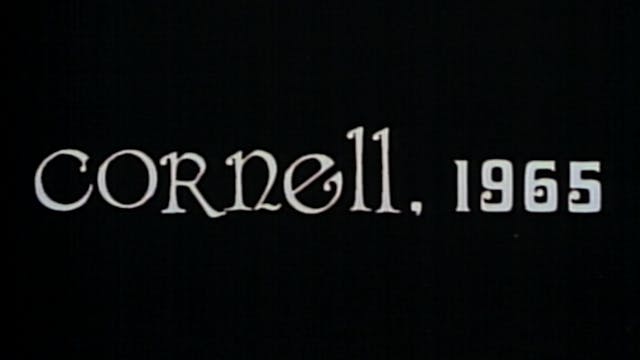CIRCUS SAVAGE Chapter X
LAWRENCE JORDAN
•
1h 2m
At the close of the first decade of the 2000s, Lawrence Jordan wove together a vast river of image and sound from unused film material piled-up in his studio since 1952. In essence, this is his visual autobiography, including clips from strange and unusual appropriated footage, outtakes from many of his films as well as material from uncompleted projects.
The opening frame of the tenth chapter, consisting of reels twenty-eight to thirty, reads "the end" inverted, back-to-front, top-to-bottom. A re-beginning of a sort, the second-to-last chapter leans heavily on abandoned projects, outtakes and extraneous footage, all fascinatingly assembled. A collision of visions, found and fabricated, of shadow puppetry, silent-era stop-motion puppet animation, astonishing telescopic footage of the solar system, a Ginger Rogers / Fred Astaire two-fer with excerpts from the trailers of the RKO films ROBERTA (1935) and THE GAY DIVORCEE (1934), a handful of riveting point-of-view kaleidoscopic moments, a bevy of children performers and sequences from an untitled "exquisite corpse" SFAI animation project from 1983. A comparatively brief conclusion follows Joanna McClure in further H.D. TRILOGY (1992-1994) travels interspersed with two elusive title-cards: "Getting down to business" and "a stone thrown into the water forms waves." So it goes.
Up Next in LAWRENCE JORDAN
-
CIRCUS SAVAGE Chapter XI
At the close of the first decade of the 2000s, Lawrence Jordan wove together a vast river of image and sound from unused film material piled-up in his studio since 1952. In essence, this is his visual autobiography, including clips from strange and unusual appropriated footage, outtakes from many...
-
CIRCUS SAVAGE Chapter XII
At the close of the first decade of the 2000s, Lawrence Jordan wove together a vast river of image and sound from unused film material piled-up in his studio since 1952. In essence, this is his visual autobiography, including clips from strange and unusual appropriated footage, outtakes from many...
-
CORNELL, 1965
In 1965, Lawrence Jordan worked as an assistant to Joseph Cornell on his boxes and films. Jordan filmed his work extensively and as much as he could of the artist (and it is the only film-footage that exists of Cornell). Jordan edited the film in 1978 when he determined that it would be a kind of...



